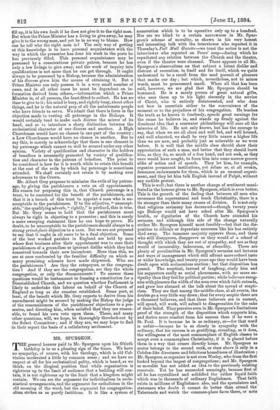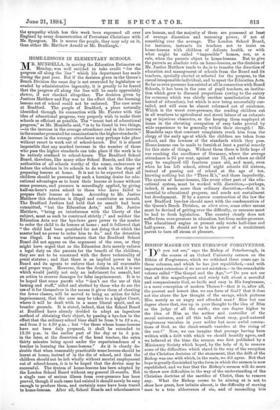MR. SPURGEON.
THE general honour paid to Mr. Spurgeon upon his fiftieth birthday is to us a pleasing sign of the times. We have no sympathy, of course, with his theology, which is old Cal- vinism moderated a little by common sense ; and we have no respect at all for his ecclesiastical polity, which is based, as we think, on the illogical position that while organisation is righteous up to the limit of audience that a building will con- tain, it is not righteous up to the limit that a kingdom might contain. We can see the argument for individualism in eccle- siastical arrangements, and the argument for catholicism in the old meaning of the word, but the argument for congregation- alism strikes us as purely factitious. It is like a system of numeration which is to be operative only up to a hundred. Nor are we blind to a certain narrowness in Mr. Spur- geon's scheme of morality, as shown in his very honest and interesting talk with the interviewer who reported it in Thursday's. Pall Mall Gazette—we trust the writer is not the interviewer who reported on Pears' soap—during which he repudiated any relation between the Church and the theatre,
even if the theatre were cleansed. There appears in all Mr.
Spurgeon's observations on that subject a latent dislike and distrust of recreation, in itself and for itself, which we quite understand to be a recoil from the mad pursuit of pleasure that marks our day ; but which, nevertheless, not to mince words, must be pronounced small. When all that has been said, however, we are glad that Mr. Spurgeon should be honoured. He is a manly person of great natural gifts, who uses them up to his light sincerely in the service of Christ, who is entirely disinterested, and who does not bow in essentials either to the convenience of the moment or to the prejudices of his congregation. He teaches the truth as he knows it fearlessly, spends great earnings for the cause he believes in, and stands up firmly against the dominant idea that a rosewater philanthropy will cure all the miseries of life. He not only knows, but has the courage to say, that when we are all clean and well fed, and well housed, and well educated, we shall be very little nearer a higher life than we are now, and probably just as miserable as we were before. It is well that the middle class should show their appreciation of such a man, and better that they should leave him, as they do, so much of a free hand, and not seek, as they once would have sought, to force him into some narrow groove alike of action and of speech. They let him, for example, organize permanent institutions, yet refuse or, at all events, denounce endowments for them, which is an unusual experi- ment, and they let him talk English instead of Pulpit, without any audible protest.
This is well ; but there is another change of sentiment mani- fested in the honour given to Mr. Spurgeon, which is even better.
This is the growth of the feeling that between all men who reverence the supernatural and teach Christianity, there is a tie stronger than their many causes of division. It is not only that religions acrimony has decreased—though twenty years ago Bishops would not have asked after Mr. Spurgeon's health, or dignitaries of the Church have attended his sermons, and although this side of the change naturally strikes Mr. Spurgeon himself most forcibly—but that the dis- position to ridicule or depreciate successes like his has entirely died away. The immense majority approve them, and those who still disapprove, disapprove as they would of a school of thought with which they are out of sympathy, and not as they would of immorality, indecorum, or absurdity. There are plenty of peculiarities in Mr. Spurgeon's sermons and lectures and ways of management which still affront more refined taste or wider knowledge, and twenty years ago they would have been dwelt upon with acrimonious unction ; but that disposition has passed. The sceptical, instead of laughing, study him and his supporters coolly as social phenomena, with no more an- tipathy than they feel for political parties; while believers recog- nise with pleasure the width of the area over which faith extends, and grow less alarmed at the talk about the spread of scepti- cism. They see that among the middle-class, at all events, the doubts go a very little way down; that for every sceptic there are a thousand believers, and that these believers are in earnest, will spend, will work, will submit to disagreeables for the sake of their belief. They perceive even in Mr. Spurgeon's limitations proof of the strength of the disposition which supports him, and derive more comfort from his success than if he were a St. Paul. It is because he is so ordinary, or—for that word is unfair—because he is so closely in sympathy with the ordinary, that his success is so gratifying, revealing, as it does, the willingness of the most commonplace of English classes to accept even a commonplace Christianity, if it is placed before them in a way that comes directly home. Mr. Spurgeon as
orator belongs to the second rank, or rises above it only in a Cobden-like directness and felicitous homeliness of illustration ; Mr. Spurgeon as organiser is not even Wesley, who from the first looked beyond the largest of congregations ; and Mr. Spurgeon as moralist has not added an idea to the previously existing reservoir. Yet he has succeeded amazingly, because first of all he has crystallised and solidified the rather liquid faith -which was in thousands of ordinary Englishmen. That faith exists in millions of Englishmen also, and the speculators and statesmen who doubt it cannot do better than attend the Tabernacle and watch the common-place faces there, or note
the sympathy which has this week been expressed all over England by every demonstration of Protestant Christians with Mr. Spurgeon. He is nearer the people, they may rely on it, than either Mr. Matthew Arnold or Mr. Bradlaugh. •



































 Previous page
Previous page